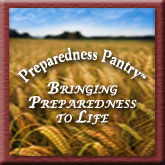--Amaranth--
A versatile, gluten free grain with a rich history. Native to the Americas and has been used in South America for centuries. This small, yellow seed was quickly recognized by early Aztecs as a power food for their warriors. Amaranth is harvested from an attractive plant which grows like a weed and produces edible leaves that can be used like spinach. One plant can contain as many as one million seeds. The grain itself has a mild grassy flavor that is especially wonderful toasted or popped.
*To pop use a deep pot with no oil. Heat the pot and add a pinch to see of the pot is hot enough. If those pop without burning quickly, you have found the right heat (about medium high). Add no more than 2 tablespoons at once, quickly swirl around the pot until mostly popped and dump into a glass bowl before adding more. 1/4 cup will yield 1 cup of popped. Add popped Amaranth to lighten the texture of dough.
*Cook Amaranth with other grains to increase the protein value.
Cost:
20 cents a serving at $2.00 per lb.
1 lb = 2.2 cups dry = 5 cups cooked = 3 cups flour
To Cook:
1 cup grain to 3 cups water
Simmer 15 minutes, soaked
Simmer 45 minutes, un-soaked
Strain and rinse if desired
To Store:
-Whole - indefinitely in an air tight container in a cool, dry place.
(For long term storage freeze for 48 hours before storing.)
-Flour and popped grains - up to 2 weeks in an air tight container, or freeze up to 1 year.
-Cooked - refrigerate for up to 10 days, or freeze up to 6 months.
To Use:
-Grind in blender and cook for a nutritious baby food
-Use flour for thickening sauces and gravies
-Flour may be added to baked goods.
-Cook to make a hot breakfast cereal.
-Whole amaranth adds crunch to breads.
-Pop and use in breads, cookies, candies and salads.
Nutritional Value per 100 grams (3.5 oz)
Calories 371 Total fat 7 g
Dietary fiber 7 g Protein 14 g
Carbohydrate 66 g Thiamin 0.1 mg 8%
Riboflavin 0.2 mg 12% Niacin 0.9 mg 5%
Vitamin B6 0.6 mg 30% Folate 82mcg 21%
Pantothenic Acid 1.5 mg 15% Calcium 159 mg 16%
Iron 7.6 mg 42% Magnesium 248 mg 62%
Phosphorus 557 mg 56% Potassium 508 mg 15%
Zinc 2.9 mg 19 % Copper 0.5 mg 26%
Manganese 3.3 mg 167% Selenium 18.7 mcg 27%
Tuesday, February 2, 2010
Subscribe to:
Post Comments (Atom)



No comments:
Post a Comment